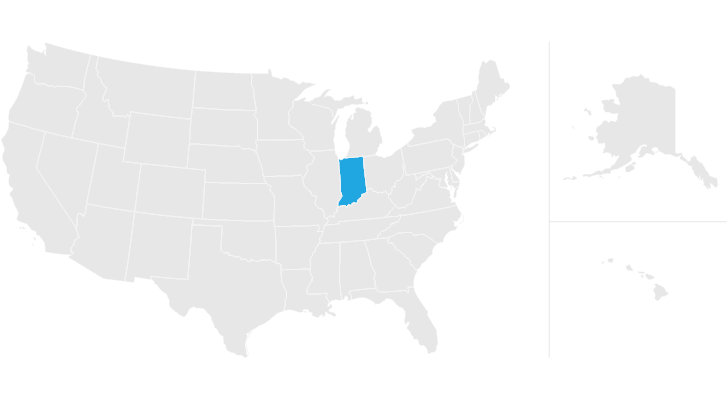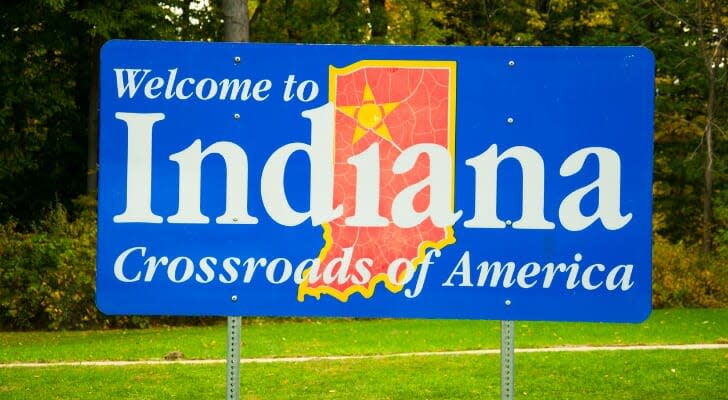Inheritance Laws in Indiana

Although some Indiana residents will have to pay federal estate taxes, Indiana does not have its own inheritance or estate taxes. Below we detail how the estate of Indiana will handle your estate if there’s a valid will as well as who is entitled to your property if you have an invalid will or none at all. Matters of estate planning and inheritance can be quite complicated, so if you’re looking for extra guidance in understanding Indiana inheritance laws, check out SmartAsset’s SmartAdvisor tool. By answering a few personal questions, you get paired with financial advisors in your area who are able to help you strategize for everything related to estate planning.
Does Indiana Have an Inheritance Tax or Estate Tax?
Indiana levies no state taxes on the inheritance or estates of residents and nonresidents who own property there. However, be sure you remember to file the following:
Final individual federal and state income tax returns – each due by tax day of the year following the individual’s death
Federal estate/trust income tax return – due by April 15 of the year following the individual’s death
Federal estate tax return – due nine months after the individual’s death, though an automatic six-month extension is available if asked for prior to the conclusion of the nine-month period
As of 2018, this is required only of individual estates that exceed a gross asset and prior taxable gift value of $11,180,000
Filing a typical tax return is simple, but completing one in the name of a decedent’s estate requires a little more work. You can apply online, by fax or via mail with the IRS to receive an employer identification number (EIN). This all-important number will represent the estate in all tax situations.
Dying With a Will in Indiana
For a will to be considered valid under Indiana inheritance laws, it must not only be handwritten or printed, but also contain the decedent’s signature along with those of two witnesses. Should a decedent be physically unable to sign his or her will prior to passing away, another person can sign for him or her. However, the decedent must give explicit direction for this to happen.
Anyone who creates a will that meets these requirements leaves behind what’s considered a “testate” estate. This is undoubtedly the most ideal situation, as it affords the highest level of inheritance control to the decedent, allowing his or her personal wishes to dictate who receives his or her property after death.
An executor, sometimes called a personal representative and appointed through the decedent’s will, is essentially the manager of an estate. Duties for this position include paying off debts the decedent never took care of, distributing property to heirs and overseeing all final expenses.
Dying Without a Will in Indiana

Intestate succession becomes the blueprint for the inheritance of a decedent’s property should he or she die without having created one. Each state handles this scenario differently, though in Indiana, intestate heirs include everyone from your spouse and children to your aunts and uncles.
The property the decedent owned gets split up into real property and personal property. Homes and any land are real property, while personal property is anything else, like your car and jewelry. Depending on who survives you, these items are inherited in varying percentages for different people.
Similar to its testate counterpart, an intestate estate requires its own executor to carry out property inheritances according to intestate succession law. In a perfect world, this would be someone who’s familiar with the decedent.
The Probate Process in Indiana Inheritance Law
While it typically gets a bad rap, probate was added into Indiana inheritance laws to protect the last wishes of a decedent, whether he or she had a testate will or not. If a decedent died intestate, the court will try to ensure proper intestate succession. Ultimately, though, the value of the estate governs how the court system will handle it. These options include:
Supervised probate – This form of probate is the most hands-on and call for court approval for any inheritances or other distributions of the estate.
Small estate – Estates containing property worth less than $50,000 in total can skip probate, although this does not include any real estate of the decedent.
Unsupervised probate – This is essentially an in-between and requires much less court attention than supervised probate. However, the estate executor and all heirs must consent to this form of probate.
Spouses in Indiana Inheritance Law
A spouse’s share of an intestate decedent’s estate varies quite a bit and is dependent on who also survives him or her. For example, if the decedent and spouse have a child together, or a grandchild of a deceased child, the spouse is entitled to half of the estate.
For decedents who had at least one child with an ex-partner, though, the spouse’s share of the estate will alter. In this case, the spouse receives half of the decedent’s personal property and one-quarter of his or her real property, although any monetary claims against the real estate will need to be subtracted, according to Indiana inheritance laws.
Let’s say there are no children in play but the decedent’s parents survive him or her. Because parents are considered further relatives than direct descendants, the spouse is given three-quarters of the estate, with the leftover one-quarter going to the parents.
In Indiana, if a spouse is found to have left or been cheating on the decedent at the time of his or her death, that surviving spouse could lose any rights to the estate.
Children in Indiana Inheritance Law
The inheritance of a child in Indiana is largely predicated on who their biological or adoptive parents are and whether their parent died with a surviving spouse or not. Should that last scenario occur, the intestate estate will be divided evenly, or “per stirpes,” between all children of the decedent, according to Indiana inheritance laws.
When a child’s parent passes away intestate and the surviving spouse is his or her other parent, that child will inherit half of the decedent’s estate. However, if the decedent got remarried to a person other than the child’s parent before he or she died, the child receives whatever is left over following the spousal claim of one-quarter of the real property and half of the personal property of the decedent.
Intestate Succession: Spouses & Children Inheritance Situation Who Inherits Your Property – If spouse, but no children or parents – Entire estate to spouse – If spouse, and at least one child with spouse or grandchild of the deceased child – 1/2 of estate to spouse
– 1/2 of estate split evenly among children or grandchildren – If spouse, and at least one child with previous spouse or grandchild of the deceased child – 1/2 of personal property to spouse
– 1/4 of real property value to spouse, minus any monetary claims made against the property
– Balance of the estate split evenly among children or grandchildren – If spouse and one or both parents, but no children – 3/4 of estate to spouse
– 1/4 of estate to parent(s) – If children, but no spouse – Estate split evenly among children
Biological and adopted children are one and the same in Indiana, meaning they’ll each receive equal inheritances, according to Indiana inheritance laws. A child is deemed biologically yours also if he or she was conceived before you died, but born after. For this, the child will inherit as if he or she were alive when you died.
If a child was born illegitimately, or out of wedlock, he or she will receive inheritance rights as if his or her parents were married. In the case of a father who is a decedent, though, paternity must be proven and can be done in a few different ways. These include a paternity test, admission by the father, a marriage between the father and mother and more.
Unless you decide to adopt your stepchildren and foster children legally, they will not be granted any rights to your intestate estate.
Unmarried Individuals Without Children in Indiana Inheritance Law
A surviving spouse and surviving children are typically the most common types of intestate heirs. So where will your property end up if you’re unmarried and have no children? This chart lays it out, step-by-step:
Intestate Succession: Extended Family Inheritance Situation Who Inherits Your Property – If parents, but no spouse or children – Entire estate to parents – If parents and siblings – Estate split evenly between siblings and parents
– Minimum share for a parent is 1/4 of the estate – If parents and deceased siblings – Estate split evenly between parents, nieces and nephews
– Minimum share for a parent is 1/4 of the estate – If no parents or siblings – Estate split evenly between nieces and nephews – If no nieces and nephews – Estate split evenly among paternal/maternal grandparents – If no grandparents – Estate split evenly among aunts and uncles – If no aunts and uncles – Estate split evenly among cousins
Escheatment is the process by which the state will absorb your property and take ownership of it should there be no valid person to receive it. In Indiana inheritance law, there is hardly any familial stone that goes unturned, making it very likely that your property will be inherited by a relative of some degree, though.
Non-Probate Indiana Inheritances
While the probate process isn’t necessary for every estate in Indiana, a sizable portion of them will be forced to go before the court. However, there are certain assets of a decedent that will skip past this process, as they already have heirs or beneficiaries chosen. These include:
Life insurance
Retirement accounts, like an IRA
Transfer-on-death vehicle titles, investments and real estate
Joint tenancy real estate
Living trust property
Pay-on-death bank accounts
Other Situations in Indiana Inheritance Law

Should an Indiana child’s parent be convicted of murder, voluntary manslaughter or another criminal act that caused the death of his or her other parent, the surviving parent will not be allowed to inherit from his or her child’s estate, according to Indiana inheritance laws.
As is the case in the majority of U.S. states, half-blood relatives the same exact rights as any full-blood relative of a decedent, according to Indiana inheritance laws.
The immigration status of any would-be Indiana heir is irrelevant in the eyes of state law. Therefore any individual can inherit, regardless of whether he or she is an illegal alien or non-U.S. citizen.
If a relative became pregnant with a possible heir to your intestate estate before you died, and that child is born afterwards, he or she will inherit as if he or she had been alive when you passed, according to Indiana inheritance laws.
Resources for Estate Planning
Managing your own estate, or handling the intricacies of inheriting money from the estate of a loved one who has passed away, includes many complex matters. It can be such an overwhelming venture — with taxes to file, possible court proceedings to go through and more. Sometimes you may just want a little extra help from a knowledgeable professional, especially in understanding Indiana inheritance laws.
The SmartAsset financial advisor matching tool will pair you with as many as three nearby financial advisors equipped to handle your estate and inheritance planning needs. Matches are found based on your answers to a few simple questions, so be as specific as possible when stating what you’re looking to handle in your financial life.
Photo credit: ©iStock.com/DNY59, ©iStock.com/Davel5957
The post Inheritance Laws in Indiana appeared first on SmartAsset Blog.

